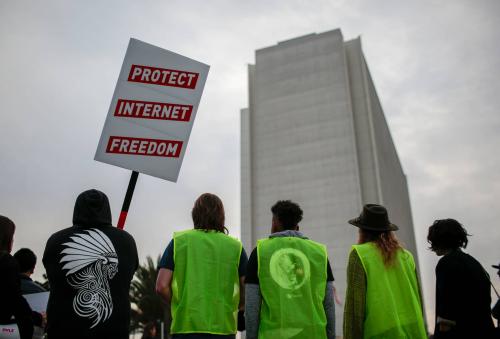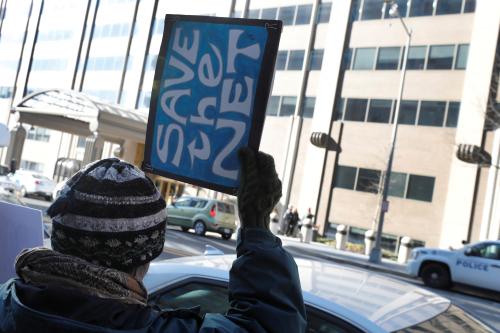Net neutrality, the principle that all bits of information on the Internet are treated equally and thus users don’t pay extra for high-bandwidth applications and services, may be in jeopardy depending on a ruling from the U.S. Court of Appeals for the Second Circuit in a case pitting Verizon Communications against the Federal Communications Commission (FCC). The court heard arguments in September.
This development comes at the same time as the new FCC Chairman Tom Wheeler takes over the agency, naming his staff and setting a new course for the commission. While his exact position on the case is unknown, Wheeler named open-Internet advocate Gigi Sohn to be counsel for external affairs.
The complex issue has featured both sides making claims of free speech and entrepreneurship, and has brought scrutiny to the regulatory authority of the federal government to prevent Internet Service Providers (ISPs) from charging different prices for services. Consider, for example, that Verizon’s (or Comcast’s or AT&T’s) customers currently pay the same service fee whether or not they watch high-bandwidth videos or simply read recipes on blogs.
Four years ago, in a major address at Brookings, then-FCC Chairman Julius Genachowski laid out his proposal for the expanded open Internet rules that eventually became, in 2010, the agency’s net neutrality position, which Verizon filed suit to overturn. Watch:
Darrell West, vice president and director of Governance Studies at Brookings, who was one of the panelists at the event, explained the chairman’s proposed new net neutrality rules. As he explained: “an anti-discrimination rule that would prevent Internet providers from blocking or slowing the utilization of competing services, and a transparency rule that would require providers disclose how they manage traffic.”
In the video below, West talked about a 2010 Verizon-Google legislative framework for net neutrality and offered his thoughts on the direction of the Internet’s development:
On the surface both Verizon and Google expressed their support for an open Internet and for giving consumers the right to choose applications. But they also left open the possibility that there are going to be new applications that come online—health information technology, smart energy grid, as well as new applications in terms of entertainment and gaming. And they seemed to leave open the possibility of differential price points for those types of new applications.
“We clearly are starting to evolve from what now is a pretty open Internet,” West said, “to a system that looks more like the rest of the U.S. economy, which is … we have the free highways and you have the toll roads, and we’re probably going to migrate to something on the Internet that looks like that kind of system.”
Brookings experts have looked at regulation of the Internet for many years. In one 2006 AEI-Brookings working paper, Robert Litan and Robert Hahn explained the Internet’s “end-to-end” design principle that led to the net neutrality framework but concluded that the idea “is a fiction.” As they wrote:
Although it may have represented a democratic, romantic ideal two decades ago, the end-to-end principle is a fiction today and should be treated as such. Policymakers should look at how the Internet really functions from both a technical and an economic perspective. Modern networks are capable of acting more intelligently than earlier networks, which means that access providers now have the ability to prioritize data for those applications that depend critically on it. If content providers are willing to pay for enhanced quality, there is no good reason for regulators to deter them.
This post will be updated as developments in the case unfold and Brookings scholars weigh in.



Commentary
Will Net Neutrality Rules Fall in Appeals Court Decision?
November 6, 2013